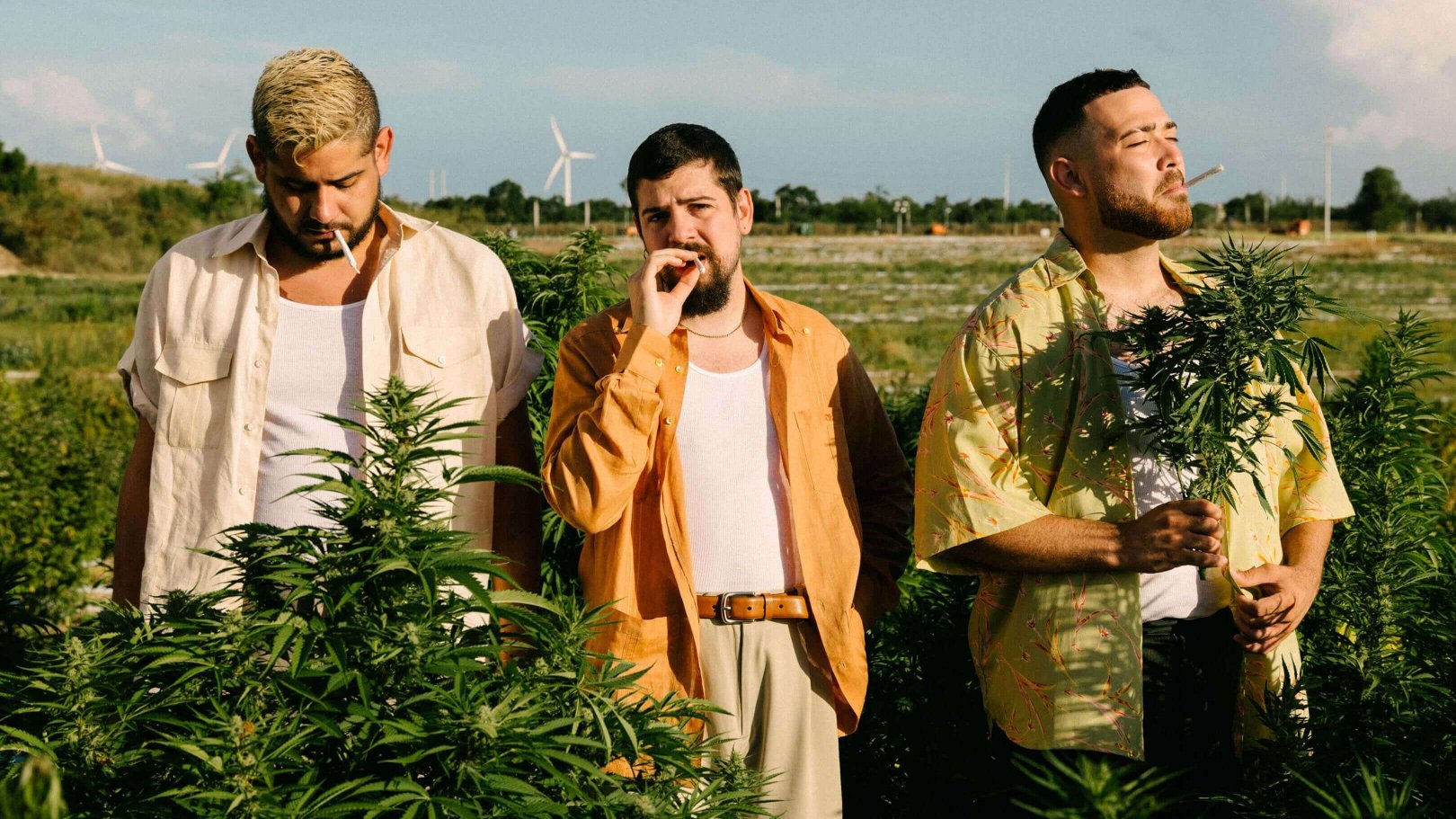Which genres of music do you associate with cannabis? Thanks to pop culture and a rising trend of artists collaborating with the cannabis industry, hip-hop, psychedelic rock, ambient, stoner country like Willie Nelson often come up. But what about bolero? In recent years, the Puerto Rican trio Los Rivera Destino have carved out a niche for themselves by putting a modern twist on the traditional, down-tempo style; incorporating not just elements of reggaeton and rock into the mix, but stoner humor, too. The group’s brand-new single “Mis Amigos” is their most explicit ode to smoking pot yet (aside from their weed-friendly podcast, Hablando Claro). Coming on the heels of their Bad Bunny collaboration “Flor” and their bolero interpretation of the smash reggaeton hit “Te Boté,” the song finds the trio - Fernando Terrazo, Carlos Figueroa and Antonio Sanchez - both celebrating pot, and addressing the people in their lives that are reluctant to embrace the herb. We caught up with the trio to learn more about Puerto Rican cannabis culture, including the island’s ongoing fight for legalization, their upcoming debut album (due out early 2022) and the Puerto Rico’s melting pot of musical diversity. This conversation has been lightly edited for length and clarity.
What’s cannabis culture like in Puerto Rico?
Carlos Figueroa: It’s like a secret that everybody knows. Everyone smokes or has a friend that smokes. It’s a big culture right now. It’s been received positively in the past five years. Fernando Terrazo: There are still people that don't accept it, but every year the situation gets better and better. Antonio Sanchez: Medical marijuana is the most popular way to buy cannabis right now in Puerto Rico. We are trying to get decriminalization, too. You can get arrested with a little bag of weed.
Do you consider yourselves public advocates of legalization?
CF: We have three shows a week [on our podcast] and are always smoking and talking about legalization. We are in favor of it. People [associate] us with it; we are stoners. AS: We live in Rio Piedras, a college town, three minutes from the biggest university on the island. Stoner culture is very popular here in town.It’s rarer that you don't smoke than you smoke.
Does your stoner identity ever become an issue as musicians?
FT: I think sometimes people think we just do boleros. We do every type of music: rock, punk, reggaeton, too. A lot of bolero singers [wish we didn’t associate it] with marijuana. Sometimes we’ll have a show where a rapper or reggaetonero is seen with marijuana and it’s no problem, but if we do it, it’s kinda weird for some people.
What do you guys like to smoke?
CF: Mostly hybrids. My favorite strain is Headband. You're not hyper but you're not in couch lock, either. AS: We don't like to be really stoned. We like being happy, not being on the couch for three hours doing nothing; that’s not our [thing]. We like to be creative, do podcasts, write songs. Do work. We don't like to procrastinate (laughs). FT: We’re stoners, not slackers.
I love that. Is there a Puerto Rican strain that people love?
AS: Borincanna! [Note: the word is a play on borincana, a slang term for someone from Puerto Rico] CF: Sour Diesel is super famous here, and OG Kush and Purple Haze; they’re the most common strains that rappers mention in songs.
I love “Mis Amigos.” It’s been stuck in my head for a week. Do you see it as a way to tackle stigmas around cannabis?
FT: I smoke the least of us. When I thought of the song, I was thinking of Carlos and Tony; for me it was something that came from the heart and people could see themselves reflected in. When it comes to the stigma, making the song and putting it out was a big step for us in terms of what we want to be or help people understand that we’re pro-marijuana. I think people could take it the wrong way, but most of [the feedback] has been positive. It's about stoners but it's also about people that don't smoke. It's something everybody could relate to. AS: We mention father figures in the song; in the past, I’ve had problems with my parents for smoking.
What do you think will surprise your fans about your upcoming debut album?
FT: There is bolero on the album but also other genres, too. Each single we’ve put out has been different from the last one; the album is a compilation of that. There are features with artists you'd be surprised would do a song with us. There's no pattern. It’s making you wonder what’s coming next.
Can you describe your musical community in Puerto Rico?
CF: Right now shows have stopped [because of the pandemic, but otherwise] every day of the week there’s a show. The furthest you can go on the island is three hours, so we play in all the cities. We come from the alternative scene where every genre is [blending together]: you can see salsa groups and punk groups at the same show. It was a surprise that the urban crew really enjoyed what we were doing and we were embraced by reggaetoneros and rappers and it was so cool for us because we could introduce that world to our crazy world of experimentation. When you see what Bad Bunny is doing right now, it’s more experimental and that’s great for music. It's what we're here for.



